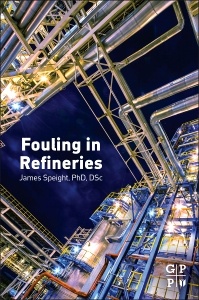Fouling in Refineries
Auteur : Speight James G.

Fouling in Refineries is an important and ongoing problem that directly affects energy efficiency resulting in increased costs, production losses, and even unit shutdown, requiring costly expenditures to clean up equipment and return capacity to positive levels.
This text addresses this common challenge for the hydrocarbon processing community within each unit of the refinery. As refineries today face a greater challenge of accepting harder to process heavier crudes and the ongoing flow of the lighter shale oil feedstocks, resulting in bigger challenges to balance product stability within their process equipment, this text seeks to inform all relative refinery personnel on how to monitor fouling, characterize the deposits, and follow all available treatments.
With basic modeling and chemistry of fouling and each unit covered, users will learn how to operate at maximum production rates and elongate the efficiency of their refinery?s capacity.
Preface
Chapter 1: The Structure of Petroleum
Chapter 2: Fouling and Asphaltene Constituents
Chapter 3: Factors Influencing Fouling
Chapter 4:Fouling in Refineries
Chapter 5: Fouling during Distillation
Chapter 6: Fouling during Visbreaking
Chapter 7: Fouling during Coking
Chapter 8: Fouling during Catalytic Cracking
Chapter 9: Fouling in Hydroprocesses
Chapter 10: Fouling in Gas Cleaning
Chapter 11: Fouling Treatment and Control
Glossary
Index
Sources. He is recognized as a world leader in the areas of fuels characterization and development. Dr. Speight is also Adjunct Professor of Chemical and Fuels Engineering at the University of Utah.
James Speight is also a Consultant, Author and Lecturer on energy and environmental issues. He has a B.Sc. degree in Chemistry and a Ph.D. in Organic Chemistry, both from University of Manchester. James has worked for various corporations and research facilities including Exxon, Alberta Research Council and the University of Manchester. With more than 45 years of experience, he has authored more than 400 publications--including over 50 books--reports and presentations, taught more than 70 courses, and is the Editor on many journals including the Founding Editor of Petroleum Science and Technology.
- Presents an understanding of the breakdown of fouling per refinery unit, including distillation and coking units
- Provides all the factors, crude types, and refining blends that cause fouling, especially the unconventional feedstocks and high acid crudes used today
- Helps users develop an analysis-based treatment and control strategy that empowers them to operate refinery equipment at a level that prevents fouling from occurring
Date de parution : 05-2015
Ouvrage de 538 p.
15x22.8 cm
Thème de Fouling in Refineries :
Mots-clés :
Asphaltene; Distillation; Visbreaking; Coking; Catalytic Cracking; Hydroprocesses; Gas Cleaning; Treatment; Heat Exchanger; Safety; Chemstry



